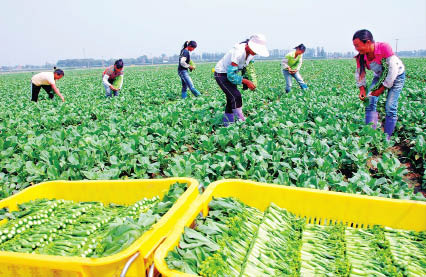The Happy Farm
Older people often recall the time when farm products were untreated and food was clean, lamenting the decline in food quality. With little to keep them busy, some of them find on these farms a means to help the community and to better feed the household. Some of them start gardening for their pregnant daughters to protect the health of mother and child.
Most farms renew their leases with tenants every year. As the demand is high and the land supply limited in big cities, there is often a long waiting list in the renewal season.
 |
|
During the harvest season tenants can reap vegetables once or twice a week. |
An Educational Mission
The Little Donkey in Beijing’s western suburb is one of the few farms to operate on both a rental basis and for sale. Every month, the farm stages a market in the downtown area to sell its produce and raise awareness about clean foods. Education about agricultural work and nature are also part of the farm’s mission, as a manager of the farm remarked in an interview with Beijing TV. Related activities are regularly organized at the farm.
People flocking to Little Donkey fall into three categories, according to the manager. The first are retirees who have more free time. Many were sent to the countryside during the “cultural revolution,” and so experience a certain pastoral nostalgia. The second are parents who want to instill in their children the value of work and healthy foods. The third type comprise childless couples who consider gardening a beneficial leisure activity.
Rental farms regularly organize events for children who visit with their parents. “Every season we advise them what to plant, how to tend crops, and raise awareness about environmental protection. We also have activities like sketching and pony rides,” the manager said.
A Means to Equalize Social Relations
The farmer who rents the land to Yan Zhen gleefully welcomes the “weekly rural exodus” of urban Beijingers to his town, as his rental income is much higher than what he would earn from working the fields himself. “In the past, the revenue from this field was only RMB 1,000-2,000 per year; now, I collect RMB 6,000 per year in rent, so I do the same work but for more money!”
In addition to economic benefits, this kind of operation on the outskirts of big cities also reduces agricultural overproduction. Farmers are usually chained to their harvests; if crops are poor they have lean income, but if crops are plentiful then prices fall. The sickle is thus a double-edged sword. City dwellers who rent land or buy directly from farmers bring them financial security that improves their quality of life. “Farms are not just a means of producing food, but also a platform for equalizing relations between different social strata. In China we say that when drinking water people should be grateful to those who dug the well,” Yan Zhen said.
A genius combination of green dining, micro-farming, education, and recreation, rental farms bring pleasure to all concerned. They certainly deserve the nickname “Happy Farm.” Now it’s time to go back to stealing eggplants, I need a couple more points to buy a packet of fertilizer!
